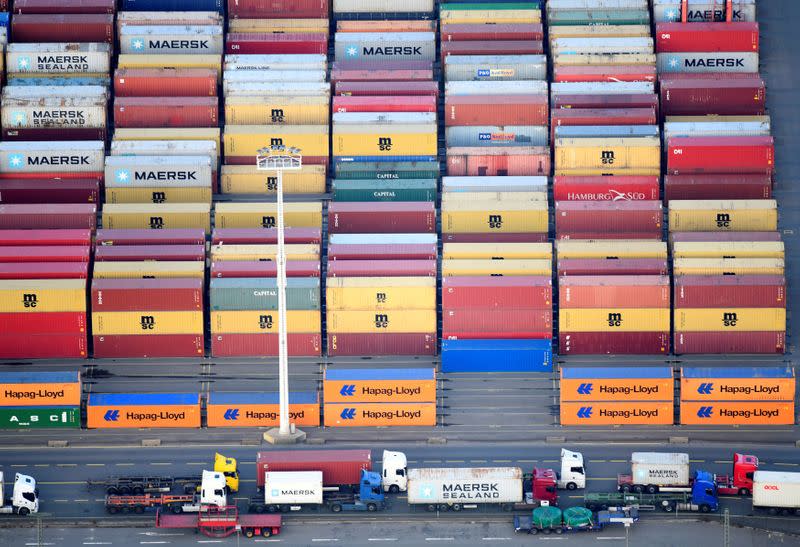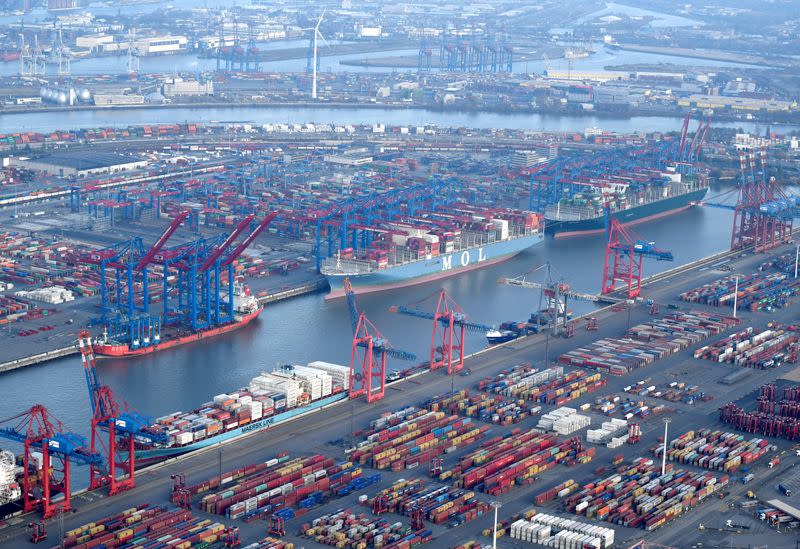German ports brace for blow from coronavirus disruptions
By Michael Nienaber
BERLIN (Reuters) - German ports are bracing for their trade to take a severe blow in the coming days as the coronavirus outbreak and related plunge in shipments from China compound a container shortage and push up transport costs in Europe's largest economy.
Since ship deliveries from China to Germany take up to six weeks, the port of Hamburg, Germany's largest trading hub, and smaller inland ports are only now beginning to feel the full impact of the COVID-19 virus, which has disrupted the container shipping trade and supply chains the world over.
"We're currently bracing for the impact. It will hit us with full force from mid-March," Axel Mattern, CEO of the Port of Hamburg Marketing, a business association that represents public and private sector entities of the harbour, told Reuters.
"The entire supply chains have been thrown completely off balance," Mattern said. "In the course of the year, we expect container volumes to drop sharply due to the coronavirus."
China is Germany's biggest trading partner, with companies depending on both Chinese demand and supply chains. In Hamburg, more than a quarter of the 9,3 million TEU container units traded in 2019 came from or went to China.
This means that China has also become the Achilles heel of the German economy, with the port of Hamburg especially vulnerable. Trade volumes at the port are already down 40% due to the Chinese New Year festivities and a series of unusually heavy storms in February, according to Mattern.
"And this period of weakness has now been extended due to the coronavirus - and there is no end in sight. Nobody can say how long this weak phase will last," he said.
There were some hopeful signs from China, where factories restarted in recent weeks.
"What we're hearing from on site in Shanghai is that there are first signs of normalisation. In Shanghai, more than 50% of employees now go to work. But then again, this also shows that we're still a long way from normal and a 'business as usual'."
The trade and supply chain problems are expected to send the economy into a recession in the first half of the year, increasing the pressure on Chancellor Angela Merkel's government to come up with a large fiscal stimulus in the coming weeks.
Economy Minister Peter Altmaier said on Tuesday he expected supply chains to be impacted especially in the industrial sector and that the full extent of the disruptions would become visible gradually over the next weeks.
BLANK SAILINGS
Shipping firms are also deeply impacted by the coronavirus outbreak. German container shipping line Hapag-Lloyd <HLAG.DE> said it was forced to reduce shipments in February through blank sailings, meaning that some vessels skipped ports or even entire routes were cancelled.
Shipping giant Maersk <MAERSKb.CO> warned last month that the coronavirus outbreak would weigh on earnings this year, compounding the woes of a container shipping industry already subdued by trade wars and an economic slowdown.
The decline in shipping traffic to and from China has led to a shortage of empty containers in Germany.
"I have just spoken to an important customer from the greater Hamburg area. They just can't get hold of containers anymore," Mattern said. "If you currently want to ship a container, you have to expect higher prices."
At the port in Duisburg, Europe's biggest inland harbour and one of its biggest hubs for freight trains from China, the coronavirus outbreak is also expected to push down trade volumes.
As part of China's belt-and-road initiative, there are normally 35 freight trains per week connecting Duisburg in the western Ruhr area directly with destinations in China.
But the number of freight trains has dropped after Chinese authorities cordoned off large cities affected by the virus, said a spokeswoman of Duisport, the local port operator, without giving further details.
Duisport CEO Erich Staake said in a statement that the spread of the coronavirus had already led to significant drops in trading volumes in the global transport industry.
"The negative impact on sales revenues and earnings will be noticeable in the entire industry and also in the business numbers."
(Reporting by Michael Nienaber; Editing by Raissa Kasolowsky)

 Yahoo Finance
Yahoo Finance 

